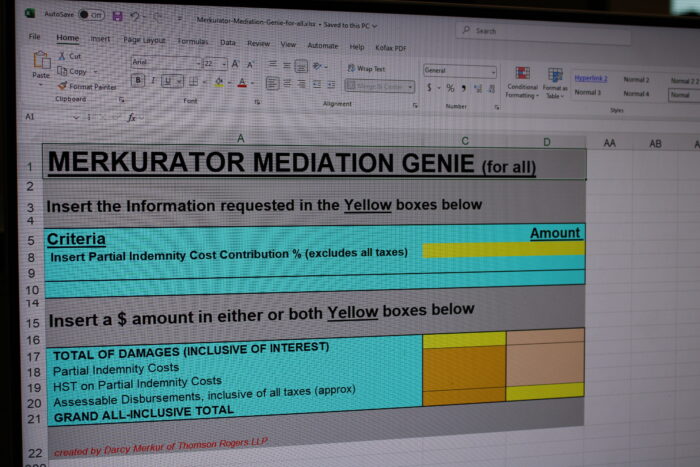How Do I Know What My Personal Injury Claim is Worth?
Author(s): Deanna S. Gilbert
March 22, 2021

It is not uncommon for people injured in a trauma (i.e. car accident, trip or slip and fall, medical negligence, etc.) to wonder what their case may be worth. Indeed, it is important to consider the potential value of the case from the outset because the reality is that personal injury lawsuits can be time-consuming, expensive, and intrusive for the person suing (the “Plaintiff”). It is wise to weigh the potential value of the case against the potential costs to determine whether the case is worth pursuing at all.
With that said, Plaintiffs should not expect personal injury lawyers to tell them precisely what their case is worth on day one, let alone towards the conclusion of the case. The truth is that the only person or persons who can determine the precise value of the case is the trier of fact (i.e. the judge or jury deciding the case in Court). Unless or until that determination is made at trial, the personal injury lawyer’s job is really to consider the types of claims that may be advanced, the facts and evidence applicable to those claims, other factors that may impact the overall value of the case, other cases that have been determined at trial involving similar facts, and to ultimately consider the reasonable range in which the value of the case may fall.
Typically, a personal injury case may involve advancing any or all of the following claims for compensation (“heads of damages”):
- General Damages – The Plaintiff’s pain, suffering, and loss of enjoyment of life having regard to factors such as: the nature, severity, and permanence of the injury; the age of the Plaintiff; if the Plaintiff was hospitalized, underwent surgery, suffered scarring, or will have permanent hardware inserted; any future risks (e.g. arthritis or more surgery); any unrelated pre or post-incident health problems; and the overall impact of the injury on the Plaintiff’s life.
- Past and Future Income Loss – The Plaintiff’s loss of income, earning capacity, and/or competitive advantage in the workplace having regard to factors such as: the Plaintiff’s rate of pay; time off work; changes or accommodations to duties; the Plaintiff’s ability to re-train for another job that may be reasonably suitable for the Plaintiff and the Plaintiff’s likely retirement age.
- Past and Future Healthcare Expenses – The cost of the Plaintiff’s past and future medical, rehabilitative, and/or attendant care needs.
- Other Pecuniary Losses – The Plaintiff’s past or future out-of-pocket expenses; the cost of housekeeping and home maintenance assistance; and the cost of caregiving assistance.
The value of each of these heads of damages will depend upon the specific facts and evidence in each case. People should never assume that because they had a friend suffer a similar injury and receive compensation, they will be similarly compensated.
By illustration, it should be no surprise that a 65 year-old retiree with a pre-accident history of arthritic fingers would receive far less compensation for a fractured thumb than would an otherwise healthy 40 year old surgeon. It is less so the injury per se that matters and more so the functional impact of that injury that counts.
There are also more general factors that can impact the overall assessment of damages in any case, which may include, but not be limited to:
- Liability (Contributory Negligence) – To the extent that a Plaintiff is attributed any degree of shared responsibility for the traumatic incident, the value of the Plaintiff’s case will be decreased by that same degree (i.e. if a Plaintiff is 25% at-fault, the Plaintiff will recover 75% of the damages).
- The Type of Case – Personal injury cases arising from motor vehicle accidents are subject to additional laws that may impose a threshold level of injury that must be achieved to claim certain damages, a statutory deductible that may be applied to reduce the value of those damages; a deduction for other benefits and/or payments that the Plaintiff has received.
- Credibility – To the extent that there is evidence calling into question the veracity of the Plaintiff’s presentation or claims, the entire case can be impacted.
In summary, determining what a case may be worth is more so an artform than a science. There is rarely a quick and easy answer. Rather, it involves a multi-factorial analysis of the facts, evidence, and circumstances of the case that generally leads to a reasonable range of what the case may be worth.
Thomson Rogers offers free consultations so please feel free to reach out to us at any time. We are here to help.
Deanna Gilbert is a personal injury lawyer and a partner at Thomson Rogers. Her practice is devoted to representing Plaintiffs in personal injury litigation including cases arising from motor vehicle accidents, medical malpractice, slip and falls, product liability and assaults. Deanna can be reached at 416-868-3205 or by EMAIL.
For Thomson Rogers updates please subscribe to our email list here.
Share this





